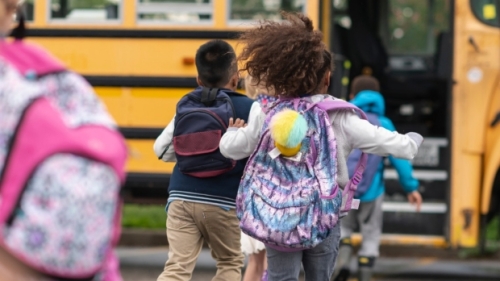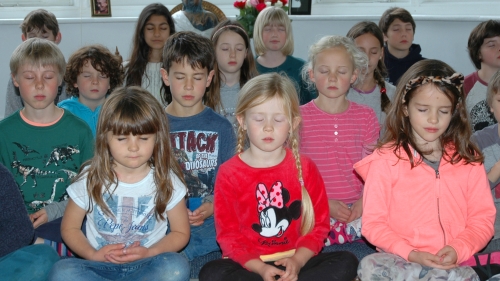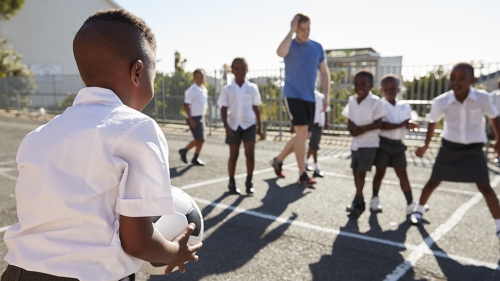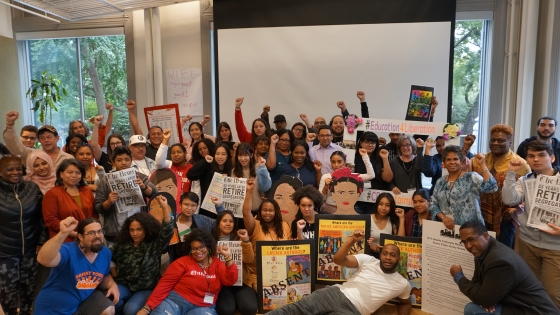The Alliance to Reclaim our Schools
Neither President Trump nor Education Secretary Betsy DeVos have any experience in public education. They have not been teachers, administrators or even parents of public school students. Yet they are moving aggressively to upend public education as we know it, and to redirect public school funding to private schools. Just last year, Betsy DeVos proposed that the Detroit Public Schools—the whole district—simply be shut down, and the money provided to private and charter schools. Now that she is our Secretary of Education, DeVos and
Trump are taking action towards creating a federal voucher program, dramatically increasing funding for charter schools, and encouraging states to do the same. This is an extremist agenda that will disproportionately impact black and brown communities and schools. We need to know the facts.
What are Vouchers?
Voucher programs provide public money for individual students to go to private or religious schools. They can be paid for either directly with state or federal dollars, or indirectly through tax credits for wealthy individuals or corporations that contribute to a voucher fund. There are currently a total of 25 different voucher programs operating in 14 states plus the District of Columbia. Each state’s program is a somewhat different. For example, some programs restrict eligibility to students with disabilities, low-income students, or students enrolled in “failing” schools. So far, all of these voucher programs are state-based and state funded, except for the District of Columbia’s, which was imposed by Congress and is funded with federal tax dollars. Check here to find a state-by-state listing of voucher programs.
Check here to find a state-by-state listing of voucher programs.

Photo courtesy of Getty Images/FatCamera
MYTH:
Students Who Receive Vouchers are Automatically Able to Attend the Private or Religious School of their Choice
FACTS:
Often, private or religious schools that accept vouchers require that applicants meet the same admissions criteria and pay the same tuition as their other students. In Ohio, for example, students must first apply and be accepted in a private school, before applying for a voucher.
Admissions criteria are set by the school, and can include grade-point averages, interviews, essays or other tests.
Private and religious schools may also charge full tuition to applicants with vouchers. Therefore, if a private school has a regular tuition of $6,000 and a student’s voucher is worth $4,000, the family will still have to pay the remaining $2,000, plus any required fees for uniforms, textbooks, activities fees, meals or other items.
And of course, as private schools, they are free to suspend or kick out students at any time for any reason. They are under no obligation to retain, or provide services to all students, as public schools are.
It is therefore no surprise, for example, that the Fordham Institute, in conducting an evaluation of Ohio’s voucher program, found that participants “are somewhat higher achieving and somewhat less economically disadvantaged” than students who were eligible to use vouchers, but chose not to.

MYTH:
Students Who Attend Private or Religious Schools Get a Better Education
FACT:
Not according to the research. Virtually all current studies of academic outcomes for voucher students have found that students perform no better—and in many cases worse—than their peers who remain in traditional public schools. An evaluation of Washington, D.C.’s voucher program found “no conclusive evidence that the [program] affected student achievement.” [i] In Louisiana, researchers found that the voucher program had a negative impact on participating students’ academic achievement in the first two years of its operation. [ii] The Fordham Institute, expressed concern that students suffered academically at Ohio’s voucher schools. Fordham noted that many of the schools that participate in the voucher program are of poor quality. Yet because they are private entities, there are few accountability measures that would force these schools to close or improve.

MYTH:
Vouchers Programs do not Impact Local Public School Funding
FACT:
Voucher programs reduce available funding for public schools. Whether they are funded directly with public dollars, or funded through tax credits, vouchers reduce the amount of money available to public schools. Like charters, over time they drain much needed resources away from public schools, causing layoffs, program cuts and even school closings.
Indiana’s voucher programs together cost the state’s public schools $115 million in transferred revenues in the 2014-2015 school year alone. An evaluation of the state’s programs confirmed that diverting taxpayer dollars away from the state’s public education system, in to lower-performing private religious schools, was likely to lower student achievement in the state over time. [iii]
MYTH:
Schools that accept vouchers will be held to the same expectations and standards as public schools
FACT:
This is not true. Like many charter schools, there is little transparency or accountability to the public. Privately-operated schools are not required to report the same data, follow the same rules or disclose their budget and spending the way public schools are. Nor are they required to enroll or retain students who don’t meet the school’s academic requirements or who require additional expensive services.
MYTH:
School choice is good for children and families
FACT:
Taking money away from public schools is not good for the majority of children who attend and will
continue to attend them. Real school choice can only exist if all public schools have the resources they need to
provide an excellent education for all children. Polling shows that neighborhood public schools are the first choice for parents, as long as those schools are safe, high quality learning communities. Instead of taking resources away, we should be funding and staffing them
better serve their students and communities.
Developed with the support of the Annenberg Institute for School Reform at Brown University.
REFERENCES
[i] “Evaluation of the DC Opportunity Scholarship Program,” National Center for Education Evaluation and Regional
Assistance, U.S. Department of Education, June, 2010.
[ii] “How Has the Louisiana Scholarship Program Affected Students? A Comprehensive Summary of Effects After Two Years,”
Education Research Alliance for New Orleans, February, 2016.
[iii] “Analysis of Indiana School Choice Scholarship Program,” Center for Tax and Budget Accountability, April 2015.

